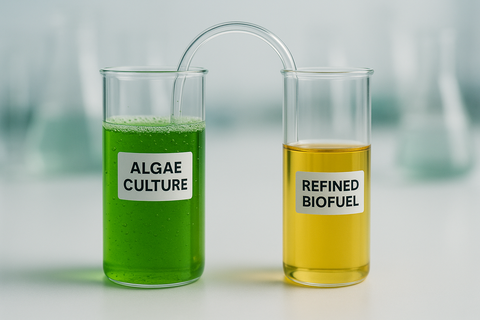In the quest for sustainable and renewable energy sources, microalgae have emerged as a promising candidate for biofuel production. This blog delves into the relationship between microalgae and biofuel, exploring the production processes, applications, advantages over fossil fuels, and the potential global impact of algae-based biofuels.
Understanding Microalgae
Microalgae are microscopic photosynthetic organisms found in freshwater and marine environments. They can convert sunlight, water, and CO2 into biomass, which can then be processed into various types of biofuels. The high lipid content in certain strains of microalgae makes them particularly suitable for biofuel production, especially biodiesel.
What is the Role of Microalgae in Biofuel Production?
Microalgae play a crucial role in biofuel production due to their ability to produce large amounts of lipids, which can be converted into biodiesel. The process leverages the natural photosynthetic efficiency of algae to generate biomass that can be harvested and processed into renewable energy.
Biofuel Production from Microalgae
The production of biofuel from microalgae involves several key steps:
How to Extract Biofuel from Algae?
- Cultivation: Microalgae are cultivated in open ponds or closed photobioreactors, where they grow rapidly under optimal conditions.
- Harvesting: Once a sufficient biomass concentration is reached, the microalgae are harvested through methods such as centrifugation, flocculation, or filtration.
- Extraction: The lipids (fats) within the algal cells are extracted using mechanical or chemical methods. Solvents like hexane are commonly used for this process.
- Conversion: The extracted lipids are then converted into biodiesel through a chemical process called transesterification. Other biofuels, such as bioethanol and biogas, can also be produced from the carbohydrate and protein fractions of the algal biomass.
What are the Steps in Algal Biofuel Production?
The steps involved in algal biofuel production include cultivation, harvesting, extraction, and conversion. Each step is critical to ensuring that the maximum amount of biofuel is obtained from the algal biomass.
Applications of Algae Biofuel
Algae-based biofuels have a wide range of applications, including:
- Transportation: Biodiesel and bioethanol derived from microalgae can be used as drop-in fuels for cars, trucks, airplanes, and ships, reducing reliance on fossil fuels.
- Power Generation: Algal biofuels can be used to generate electricity in power plants, providing a renewable alternative to coal and natural gas.
- Heating: Biofuels can be used for industrial and residential heating purposes, helping to decarbonize the heating sector.
How is Algae Important to Biofuel?
Algae are crucial to biofuel production due to their high growth rates, ability to produce substantial lipid content, and their versatility in various applications, from transportation to power generation.
Advantages of Algae Biofuel Over Fossil Fuels
Microalgae-based biofuels offer several significant advantages over traditional fossil fuels:
Why is Microalgae a Good Source of Fuel?
- Renewability: Unlike fossil fuels, which are finite resources, microalgae can be cultivated continuously, providing a sustainable source of energy.
- Carbon Neutrality: The CO2 emitted during the combustion of algal biofuels is offset by the CO2 absorbed during the algae's growth, resulting in a closed carbon cycle.
- Higher Yield: Microalgae can produce significantly more biomass per unit area compared to terrestrial crops, making them a more efficient source of biofuel.
- Non-Competition with Food Crops: Algae can be grown on non-arable land and do not compete with food crops for agricultural space, water, or nutrients.
- Environmental Benefits: Algal biofuel production can utilize wastewater and industrial CO2 emissions, contributing to waste reduction and pollution control.
What are the Challenges in Using Microalgae for Biofuel Production?
While the benefits are substantial, challenges such as high production costs, technological barriers, and scalability issues must be addressed to make algae biofuels commercially viable.
Impact on the World
The adoption of microalgae-based biofuels could have a profound impact on the global energy landscape:
What is the Role of Algae in Biofuel Production and Carbon Capture?
Microalgae not only produce biofuel but also play a significant role in carbon capture. During their growth, they absorb CO2 from the atmosphere, helping to mitigate greenhouse gas emissions.
- Reduction in Greenhouse Gas Emissions: By replacing fossil fuels with algae-based biofuels, we can significantly reduce greenhouse gas emissions, combating climate change.
- Energy Security: Algae biofuels can be produced locally, reducing dependence on imported fossil fuels and enhancing energy security for countries worldwide.
- Economic Opportunities: The development of algae biofuel industries can create new jobs and stimulate economic growth, particularly in rural and coastal areas.
- Sustainable Development: Algae biofuels support sustainable development goals by promoting clean energy, reducing pollution, and conserving natural resources.
Is Algae Biofuel Expensive?
Currently, algae biofuel production is more expensive than conventional fossil fuels. However, ongoing research and technological advancements are expected to reduce costs and improve the economic feasibility of algae biofuels.
Which Microalgae is Best for Biodiesel Production?
Certain strains of microalgae, such as Chlorella and Nannochloropsis, are particularly well-suited for biodiesel production due to their high lipid content and rapid growth rates.
Microalgae have a unique and powerful relationship with biofuel production, offering a sustainable, renewable, and environmentally friendly alternative to fossil fuels. The advantages of algae-based biofuels, including their renewability, carbon neutrality, and high yield, make them a promising solution for the future of global energy. As the world continues to seek ways to mitigate climate change and reduce its carbon footprint, the role of microalgae in biofuel production is set to become increasingly important. By embracing algae-based biofuels, we can make significant strides towards a cleaner, more sustainable energy future, with far-reaching benefits for the environment, the economy, and society as a whole.
What is the Conclusion of Biodiesel from Algae?
The conclusion of biodiesel from algae is that it represents a viable and promising alternative to fossil fuels, with the potential to significantly reduce greenhouse gas emissions, enhance energy security, and contribute to sustainable development.





